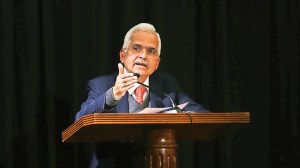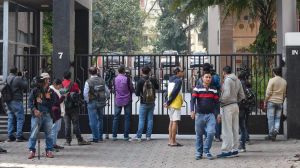India prefers to play safe
NEW DELHI, OCT 14: India reacted with the utmost caution today to the takeover of Pakistan by Gen Pervez Musharraf, the man who planned a...

NEW DELHI, OCT 14: India reacted with the utmost caution today to the takeover of Pakistan by Gen Pervez Musharraf, the man who planned and carried out the Kargil invasion.
Given that even 24 hours after the takeover, no clear signal had emerged from Islamabad as to Musharraf8217;s next step, New Delhi, instead of reflecting the worldwide tide of sharp reproval, preferred to play safe.
The Ministry of External Affairs put out a sanitised reaction to the coup: 8220;We are concerned about the developments in Pakistan. We are monitoring the situation and keeping ourselves fully informed.8221;
Reflecting this caution, Prime Minister A B Vajpayee, fresh after his swearing-in ceremony, was quoted as saying that as far as talks with Pakistan go, India 8220;was willing to talk to anyone8221;, but 8220;it is for Pakistan to create a climate for the resumption of dialogue between the two countries8221;.
The Ministry spokesman, too, refused to go beyond the deliberately low-key statement issued under Vajpayee8217;s name. The explanation here is that India does not want to react to the 8220;internal developments8221; in another country. Foreign policy analysts felt that New Delhi could well be aiming at adopting the 8220;pragmatic8221; approach made famous by the US in the past. That is why, they felt, there was no public reaction to the veiled reference to India made by Musharraf in his maiden speech on Pakistan TV early this morning: 8220;Let no outside forces think that they can take advantage of the prevailing situation.8221;
But it is believed that the very formulation of New Delhi8217;s statement was debated quite extensively within the Government before it was first released by Principal Secretary Brajesh Mishra early in the afternoon. The view that won wanted a 8220;minimalist8221; statement to be put out, presumably so that the media would not speculate about the Government8217;s intentions.
8220;India8217;s policy towards Pakistan is consistent and principled. We wish the people of Pakistan well,8221; the statement said. 8220;We remain committed to developing friendly and cooperative ties with Pakistan, based on mutual trust and confidence, for which the government of Pakistan needs to create the right environment,8221; it added.
Asked whether or not India was condemning the coup in Pakistan, the Ministry spokesman refused to comment, only saying that the prepared note was 8220;self-evident8221;.
New Delhi now feels that Musharraf may well instal a civilian puppet regime, headed by people like Moinuddin Qureshi and Shahid Burki both of whom are well-known reformers, which would be a positive signal to the West. Other possibilities are an intra-party election within the Pakistani Muslim League, or otherwise, the continuation of Musharraf himself as the chief martial law administrator.
Meanwhile, barring the US, the West reacted strongly. The European Union was most forthright we 8220;deplore8221; and 8220;condemn8221; the coup, Commonwealth Secretary-General Emeka Anyaoku threatened to expel Pakistan from the body, while British foreign secretary Robin Cook did not rule out economic sanctions against Pakistan. Japanese PM Obuchi said Tokyo was 8220;not happy at all about the way the Pakistan military forces have taken control of power8221;, while IMF chief Michel Camdessus pointed out that aid to Pakistan was now in jeopardy. Only China pointed out that 8220;Pakistan is our friendly neighbour. We are concerned with the fluid situation in Pakistan and are presently furthering our understanding of the situation.8221;
- 01
- 02
- 03
- 04
- 05































